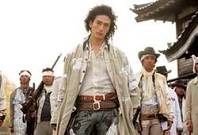|
|
||||
|
|
by Donald Levit  Cult favorite Takashi Miike turns to the spaghetti Western for his seriocomic genre homage-spoof, Sukiyaki Western Django. On one of Japan Society’s four overlapping co-presentation days with the New York Asian Film Festival, this Japan Cuts: Festival of New Japanese Film One critic suggests that this newest is something in the way of playful yet purposeful Nipponese retaliation for Hollywood remake appropriations of J-horror and casting of Tom Cruise as a samurai. That overlooks, however, the very real participation and influence of Quentin Tarantino, himself not above providing Uma Thurman with martial arts for her bride-wore-black mission. Miike’s title and a lame printed endnote spell out reverence, not only to Leone, but also to the Sergio source of other A minutes-long opening introduces Tarantino as poncho-wearing Ringo, a skilled pistolero whose cowboy accent is as unintelligible as most all the Japanese players’ phonetically recited lines. Initially puzzling but drawing gales of guffaws, Ringo is to return later on to clarify a few loose ends (as much as they ever are), just as the deliberately fake backdrops, supersaturated color, and past dream-visions will recur from time to time. Such as they are, the familial clarifications are subsidiary to action in a story filled with grotesques and violence. To Koji Endo’s Ennio Morricone-clone music complete with whistling, Yuta town is fought over by two rival gangs. Why anyone should care two cents about the miserable burg is a good question, although it semi-emerges that there is some clue to a casket of gold that somehow turns up. Both bands more or less fitted out in retro-punk, the Genji favor white in their eclectic duds and are captained by slim androgynous swordmaster Minamoto no Yoshitsune (Yusuke Iseya). Red dominating in their Mad Max couture, the Heike have madman Taira no Kiyomori (Koichi Sato) as their head. For no plot reason aside from the fun of it, the latter reads Shakespeare to his louts and insists that from now on they address him as “Henry.” Reinforced by the roses tended by a young trauma-induced mute in whose veins flows the blood of both rival clans, the history-play color coding adds spice, though hardly relevance, in reference to the fifteenth century Wars of the Roses, when the white rose of the house of York contested the red of that of Lancaster (to become Tudor) for the crown of England. No great matter for the story, though, played as it is for comic-book yuks from the first shotgun hole so big in a man’s solar plexus that a crossbow arrow sails neatly through it. Among intelligible lines that are intentional clichés from everywhere -- “a man’s gotta do what a man’s gotta do” -- the story unfolds, the weird personalities connected via sporadic distorted flashback. The cowardly sheriff (Teruyuki Kagawa) overdoes it for slapstick with his two hands pulling him towards the opposing camps, and most of the others never even get fixed names. In spite of an MPAA “R” for violence and rape, the latter isn’t full and there’s a lack of the female flesh and sex common in the director’s films. Uncommon for him, as well, two of few characters of note are women. Shizuka (Yoshino Kimura) seems your typical film saloon girl, from incongruous sort of Scheherazade dance to corset-and-stockings dishabille, while underneath she broods revenge. Not so distant as appears, is general store owner Ruriko (Kaori Momoi), who shelters the mixed-blood orphan boy, organizes resistance, finds love too late in the requisite muddy street and, shades of the Kung Fu Hustle Landlady, is underneath it all a legendary fighter in her own right. Badly beaten up, Kurosawa’s bodyguard (or yojimbo) Sanjuro recovers to match his warrior’s sword against a Colt .45. Magically if confusingly restored in his long duster, Miike’s gunman reverses weapons of choice to re-emerge and challenge the sword against snowy whiteness, thence to ride off into the sunset. Too busy to be elegiac, the satire is facile and excessive. Promoted as a “Bigger! Louder! Faster! More! . . . Eastern Western,” its gimmicks and body counts go on beyond what many non-fans will care for. Cowboy and samurai long ago ceasing to be merely national, those who prefer less over-the-top tribute should try Thailand’s gentle Tears of the Black Tiger/Fah talai jone. (Released by First Look International and rated “R” for strong violence, including a rape.) |
||
|
© 2025 - ReelTalk Movie Reviews Website designed by Dot Pitch Studios, LLC |



